|
The tiny island of Cyprus continues to be the focus of global investors. The financial situation there threatens to upset the relative tranquility that has permeated the Eurozone markets since mid-summer when ECB President Mario Draghi said the European Central Bank may undertake fresh unconventional measures in the future, including bond purchases through the securities market program (SMP), and would develop modalities aimed specifically at repairing the monetary policy transmission mechanism.
Cyprus is the fifth and latest member of the Eurozone to seek a rescue package from the troika of the European Central Bank, the IMF and the European Union. While relatively small when compared with other countries, Cyprus is seeking €10 billion. The original bailout package included the imposition of a tax on bank deposits of all sizes specifically aimed at ensuring that investors contribute to the deal. Deposits of less than €100,000 were to be subject to a levy of 6.75 percent, rising to 9.9 percent for deposits in excess of this amount. In total, the new tax was expected to generate around €5.8 billion. The package was subsequently rejected unanimously by the Cypriot Parliament and alternative ways to raise the needed euros are being sought. Cyprus looked for a loan from Russia but it was subsequently denied. Banks in Cyprus were closed for the week to prevent a run and will be closed until Tuesday — but this too could be extended.
This is the first time that savers have been threatened to be hit in this way and the move clearly raises the risk of prompting a run on banks in other financially troubled economies, notably politically gridlocked Italy and (still fiscally challenged) Spain. Any such response would increase dependency upon emergency funding from the ECB, limit the availability of much needed lending to the private sector and, by undermining still typically cautious investor sentiment, threaten the stability of the single currency itself.
On Thursday, the European Central Bank turned on the pressure and announced that it will stop emergency funding to Cypriot banks on Monday if the troubled country fails to agree on a bailout program with its European partners by then. The ECB said for it to continue emergency lending thereafter, Nicosia should adhere to the bailout conditions set by the EU and the International Monetary Fund.
At this writing (2:00 PM ET Friday), the Cyprus government is in hard negotiations with the Troika to reach a solution on bailout terms. Cypriot Finance Minister Michalis Sarris, who was in talks with Russian authorities for possible financial aid, left Moscow on Friday after failing to secure funding. Cyprus had offered Russia assets in return for cash. Separately, Cyprus agreed with Greece to spin off Greek branches in Cypriot banks. Cyprus agreed with Greece on a takeover of the Greek units of Cypriot banks, which ended uncertainty over the fate of those operations. Troika officials have increased the contribution demanded of Cyprus for its bailout package to €6.7 billion from €5.8 billion according to press reports. The troika wants to include a safety cushion of €900 million to reflect worsened fiscal conditions and expected capital outflows.
|
|
2012 |
2013 |
% Change |
|
Index |
31-Dec |
March 15 |
March 22 |
Week |
Year |
| Asia/Pacific |
|
|
|
|
|
|
| Australia |
All Ordinaries |
4664.6 |
5129.3 |
4980.8 |
-2.9% |
6.8% |
| Japan |
Nikkei 225 |
10395.2 |
12561.0 |
12338.5 |
-1.8% |
18.7% |
| Hong Kong |
Hang Seng |
22656.9 |
22533.1 |
22115.3 |
-1.9% |
-2.4% |
| S. Korea |
Kospi |
1997.1 |
1986.5 |
1948.7 |
-1.9% |
-2.4% |
| Singapore |
STI |
3167.1 |
3286.1 |
3258.6 |
-0.8% |
2.9% |
| China |
Shanghai Composite |
2269.1 |
2278.4 |
2328.3 |
2.2% |
2.6% |
|
|
|
|
|
|
|
| India |
Sensex 30 |
19426.7 |
19427.6 |
18735.6 |
-3.6% |
-3.6% |
| Indonesia |
Jakarta Composite |
4316.7 |
4819.3 |
4723.2 |
-2.0% |
9.4% |
| Malaysia |
KLCI |
1689.0 |
1627.6 |
1626.9 |
0.0% |
-3.7% |
| Philippines |
PSEi |
5812.7 |
6654.6 |
6518.7 |
-2.0% |
12.1% |
| Taiwan |
Taiex |
7699.5 |
7927.5 |
7796.2 |
-1.7% |
1.3% |
| Thailand |
SET |
1391.9 |
1598.1 |
1479.0 |
-7.5% |
6.3% |
|
|
|
|
|
|
|
| Europe |
|
|
|
|
|
|
| UK |
FTSE 100 |
5897.8 |
6489.7 |
6392.8 |
-1.5% |
8.4% |
| France |
CAC |
3641.1 |
3844.0 |
3770.3 |
-1.9% |
3.5% |
| Germany |
XETRA DAX |
7612.4 |
8042.9 |
7911.4 |
-1.6% |
3.9% |
| Italy |
FTSE MIB |
16273.4 |
16061.2 |
16045.5 |
-0.1% |
-1.4% |
| Spain |
IBEX 35 |
8167.5 |
8619.1 |
8329.5 |
-3.4% |
2.0% |
| Sweden |
OMX Stockholm 30 |
1104.7 |
1217.4 |
1196.4 |
-1.7% |
8.3% |
| Switzerland |
SMI |
6822.4 |
7864.4 |
7744.3 |
-1.5% |
13.5% |
|
|
|
|
|
|
|
| North America |
|
|
|
|
|
|
| United States |
Dow |
13104.1 |
14514.1 |
14512.0 |
0.0% |
10.7% |
|
NASDAQ |
3019.5 |
3249.1 |
3245.0 |
-0.1% |
7.5% |
|
S&P 500 |
1426.2 |
1560.7 |
1556.9 |
-0.2% |
9.2% |
| Canada |
S&P/TSX Comp. |
12433.5 |
12830.0 |
12757.4 |
-0.6% |
2.6% |
| Mexico |
Bolsa |
43705.8 |
42605.1 |
42686.7 |
0.2% |
-2.3% |
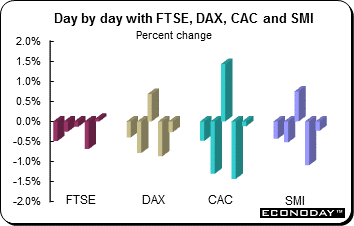 Needless to say, Cyprus dominated news with equities fluctuating on the ups and downs of the negotiation. However, despite a rally at the end of the week — investors thought the situation was easing — equities were lower on the week. The FTSE and SMI declined for the first week since February 8th. The FTSE was down 1.5 percent, the CAC lost 1.9 percent, the DAX slid 1.6 percent and the SMI declined 1.5 percent. Needless to say, Cyprus dominated news with equities fluctuating on the ups and downs of the negotiation. However, despite a rally at the end of the week — investors thought the situation was easing — equities were lower on the week. The FTSE and SMI declined for the first week since February 8th. The FTSE was down 1.5 percent, the CAC lost 1.9 percent, the DAX slid 1.6 percent and the SMI declined 1.5 percent.
Economic data disappointed. Both the German ZEW and Ifo indicated deterioration in sentiment while the flash PMIs confirmed a continued weakening in the economies of France and Germany and the Eurozone as a whole. This is in contrast to the PMI results in China and the U.S. where conditions improved.
British Chancellor of the Exchequer George Osborne, in his annual budget message, announced a relatively subtle but potentially important change to the Bank of England’s monetary policy remit. He maintained the 2 percent medium term consumer price index inflation target but said that its interpretation will be more flexible according to the state of the economy. The new remit acknowledges that unconventional policy instruments may be necessary to support the real economy while keeping inflation under control. The new framework will also put the onus on the monetary policy committee to provide — when deemed appropriate — explicit forward guidance on policy including intermediate thresholds, in order to influence the future path of interest rate rates.
At the same time, communication between the Bank and the Treasury will be made more transparent. Thus, the BoE Governor will now be required to write his open letter when inflation is above target on the day that the minutes of the next MPC meeting are published instead of the same day that the official data are released. The intention is to allow a more substantive exchange of views.
After markets closed on Friday, Fitch warned it could strip the UK of its triple A rating next month, just days after Chancellor Osborne admitted the country’s recovery would be slower and borrowing higher. The decision follows the release of the latest economic and fiscal forecasts published by the government’s fiscal watchdog, the Office for Budget Responsibility, on Wednesday to coincide with the Budget.
 Equities were down last week as the resurgence of Eurozone woes — this time from Cyprus — sent investors to safe havens. Only the Shanghai Composite managed to post a gain, of 2.2 percent. Losses ranged from 0.8 percent in Singapore to 7.5 percent in Thailand. The high flying Nikkei slumped as investors sought a currency safe haven and pushed the yen up in value and equities down. Expectations for an emergency Bank of Japan policy meeting now that the new leadership has taken the helm were dashed adding to the downward pressure on Japanese equities. Equities were down last week as the resurgence of Eurozone woes — this time from Cyprus — sent investors to safe havens. Only the Shanghai Composite managed to post a gain, of 2.2 percent. Losses ranged from 0.8 percent in Singapore to 7.5 percent in Thailand. The high flying Nikkei slumped as investors sought a currency safe haven and pushed the yen up in value and equities down. Expectations for an emergency Bank of Japan policy meeting now that the new leadership has taken the helm were dashed adding to the downward pressure on Japanese equities.
Haruhiko Kuroda's first press conference as the Bank of Japan's governor also disappointed some investors who had expected strong hints of aggressive policy easing. Kuroda reiterated his pledge to beat deflation, but provided no surprises in his comments.
On his last day as Bank of Japan Governor, Masaaki Shirakawa warned that there is no quick way to fix an economy that has suffered 15 years of deflation. Aggressive money printing alone is not the answer. His comments contrast with those of incoming Governor Haruhiko Kuroda who argues the BoJ can achieve a 2 percent inflation target in two years by pumping money more aggressively into the stagnant economy. In his final news conference as BoJ chief, Shirakawa shrugged off this view, repeating his own long held view that efforts to boost Japan's growth potential, such as deregulation and government action to boost a shrinking working population, must accompany ultra-loose monetary policy to finally defeat deflation. Kuroda has said that the BoJ can manage market and public expectations of future price moves by aggressive policy easing and showing its resolve to beat deflation. But Shirakawa warned that Japan's past experience and recent examples in the United States and Europe show there is no longer a clear link between the size of an economy's monetary base and inflation. He was also doubtful whether central banks had the power to influence inflation expectations and cautioned against focusing too much on meeting market expectations for action.
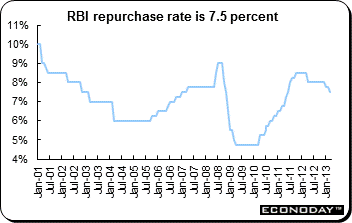 The RBI lowered its policy repo rate by 25 basis points from 7.75 percent to 7.5 percent effective immediately. The reverse repo rate and Bank rate were also lowered by 25 basis points to 6.5 percent and 8.5 percent. The Bank now has lowered its key interest rates for a second consecutive meeting. It said that room for more easing remains ‘quite limited’ because of risks stemming from inflation and the current account deficit. It left the cash reserve ratio unchanged at 4.0 percent despite acknowledging liquidity remains above its comfort zone but pledged to continue to actively manage liquidity through various instruments, including open market operations. The RBI lowered its policy repo rate by 25 basis points from 7.75 percent to 7.5 percent effective immediately. The reverse repo rate and Bank rate were also lowered by 25 basis points to 6.5 percent and 8.5 percent. The Bank now has lowered its key interest rates for a second consecutive meeting. It said that room for more easing remains ‘quite limited’ because of risks stemming from inflation and the current account deficit. It left the cash reserve ratio unchanged at 4.0 percent despite acknowledging liquidity remains above its comfort zone but pledged to continue to actively manage liquidity through various instruments, including open market operations.
The RBI clearly noted that the softening in core inflation amid high food price inflation is “driving a wedge between wholesale price and consumer price inflation” exacerbating challenges for monetary policy. On the question of growth the statement identified “accelerating investment” as the “key to reinvigorating growth,” but cautioned that reviving investment is as much a task for the Government as the RBI. According to the RBI the “government has a critical role to play” in restarting investment through fiscal consolidation, improving governance on project implementation and addressing supply-constraints. While a “competitive interest rate is necessary” to revive investment and return the economy to a high growth trajectory it is not sufficient.
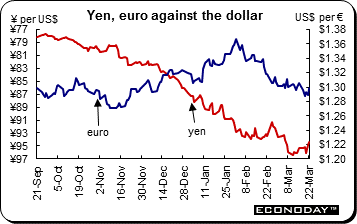 The U.S. dollar was mixed against its major counterparts last week. The euro fluctuated during the week in concert with the ups and downs in the Cyprus negotiations. The euro climbed when it appeared agreement was near and dropped when concerns escalated. On Friday, the euro climbed on optimism Cyprus is moving closer to a deal to stave off financial collapse and prevent contagion from infecting the rest of the Eurozone. The U.S. dollar was mixed against its major counterparts last week. The euro fluctuated during the week in concert with the ups and downs in the Cyprus negotiations. The euro climbed when it appeared agreement was near and dropped when concerns escalated. On Friday, the euro climbed on optimism Cyprus is moving closer to a deal to stave off financial collapse and prevent contagion from infecting the rest of the Eurozone.
The yen rebounded as traders flocked to safe havens. With the end of Japan’s fiscal year looming on March 31st, exporters look to a lower yen to enhance repatriated profits — a strengthening currency erodes the value of overseas earnings.
The pound sterling rallied last week despite coming closer to losing its top credit grade at Fitch after Chancellor of the Exchequer George Osborne said debt will rise more than previously forecast. The UK was placed on rating watch negative, “indicating a heightened probability of a downgrade in the near term,” Fitch said in a statement.
|
|
2012 |
2013 |
% Change |
|
|
Dec 31 |
Mar 15 |
Mar 22 |
Week |
2013 |
| U.S. $ per currency |
|
|
|
|
|
|
| Australia |
A$ |
1.040 |
1.041 |
1.045 |
0.4% |
0.5% |
| New Zealand |
NZ$ |
0.829 |
0.827 |
0.836 |
1.0% |
0.9% |
| Canada |
C$ |
1.007 |
0.981 |
0.977 |
-0.4% |
-2.9% |
| Eurozone |
euro (€) |
1.319 |
1.306 |
1.299 |
-0.6% |
-1.6% |
| UK |
pound sterling (£) |
1.623 |
1.509 |
1.524 |
1.0% |
-6.1% |
|
|
|
|
|
|
|
| Currency per U.S. $ |
|
|
|
|
|
|
| China |
yuan |
6.231 |
6.217 |
6.212 |
0.1% |
0.3% |
| Hong Kong |
HK$* |
7.750 |
7.761 |
7.764 |
0.0% |
-0.2% |
| India |
rupee |
54.995 |
54.025 |
54.341 |
-0.6% |
1.2% |
| Japan |
yen |
86.750 |
95.370 |
94.450 |
1.0% |
-8.2% |
| Malaysia |
ringgit |
3.058 |
3.124 |
3.112 |
0.4% |
-1.7% |
| Singapore |
Singapore $ |
1.222 |
1.248 |
1.248 |
0.0% |
-2.2% |
| South Korea |
won |
1064.400 |
1110.950 |
1119.280 |
-0.7% |
-4.9% |
| Taiwan |
Taiwan $ |
29.033 |
29.708 |
29.887 |
-0.6% |
-2.9% |
| Thailand |
baht |
30.580 |
29.540 |
29.290 |
0.9% |
4.4% |
| Switzerland |
Swiss franc |
0.916 |
0.940 |
0.941 |
-0.1% |
-2.7% |
| *Pegged to U.S. dollar |
|
|
|
|
|
|
| Source: Bloomberg |
|
|
|
|
|
|
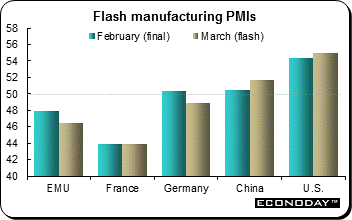 March flash composite PMI declined to a four month low of 46.5, reflecting once again similarly paced contractions in both manufacturing and services. The manufacturing PMI dropped another 1.3 points to 46.6 within which output declined at its steepest rate since December. New orders were down for the 22nd straight month, backlogs dropped at their fastest pace in three months and job losses saw their 14th consecutive monthly drop. Both input and output prices were down again, the former more sharply than in any month since July 2010. Services saw their PMI slip a marginally sharper 1.4 points to 46.5, a 5-month trough. Particularly worryingly, new orders declined at their fastest pace since September last year while the slide in backlogs lengthened to 21 months. Another decline in payrolls was however the smallest since August despite business expectations hitting a 3-month low and despite another cut in service sector charges due to still tough market conditions. Regionally within the core, the composite output index fell in both France (42.1 after 43.1) and Germany (51.0 after 53.3) although at least the latter is still signaling an increase in total output. March flash composite PMI declined to a four month low of 46.5, reflecting once again similarly paced contractions in both manufacturing and services. The manufacturing PMI dropped another 1.3 points to 46.6 within which output declined at its steepest rate since December. New orders were down for the 22nd straight month, backlogs dropped at their fastest pace in three months and job losses saw their 14th consecutive monthly drop. Both input and output prices were down again, the former more sharply than in any month since July 2010. Services saw their PMI slip a marginally sharper 1.4 points to 46.5, a 5-month trough. Particularly worryingly, new orders declined at their fastest pace since September last year while the slide in backlogs lengthened to 21 months. Another decline in payrolls was however the smallest since August despite business expectations hitting a 3-month low and despite another cut in service sector charges due to still tough market conditions. Regionally within the core, the composite output index fell in both France (42.1 after 43.1) and Germany (51.0 after 53.3) although at least the latter is still signaling an increase in total output.
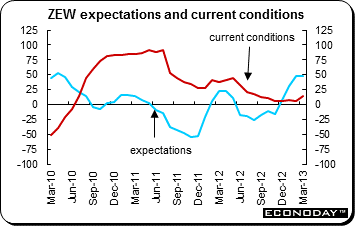 March ZEW survey current conditions index was up 8.4 points to 13.6. Expectations edged up 0.3 points to 48.5. The readings suggest that analysts have become a little more optimistic about the German economic situation. Current conditions are now at their highest level since last August and expectations, with a fourth consecutive improvement, are at their strongest reading since April 2010. The ZEW sample has become somewhat more confident about output prospects in Germany (albeit with a wary eye on unfolding developments in Italy and Cyprus) and expects to see positive growth over coming months. However, this is in sharp contrast to the full EMU survey. The Eurozone survey revealed a 0.5 point dip in current conditions to minus 76.1 and, more ominously, a 9 point decline in expectations to 33.4. March ZEW survey current conditions index was up 8.4 points to 13.6. Expectations edged up 0.3 points to 48.5. The readings suggest that analysts have become a little more optimistic about the German economic situation. Current conditions are now at their highest level since last August and expectations, with a fourth consecutive improvement, are at their strongest reading since April 2010. The ZEW sample has become somewhat more confident about output prospects in Germany (albeit with a wary eye on unfolding developments in Italy and Cyprus) and expects to see positive growth over coming months. However, this is in sharp contrast to the full EMU survey. The Eurozone survey revealed a 0.5 point dip in current conditions to minus 76.1 and, more ominously, a 9 point decline in expectations to 33.4.
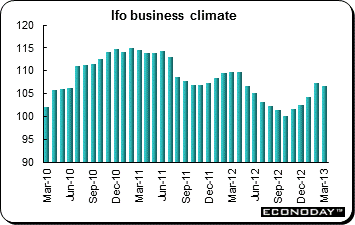 March Ifo overall sentiment slipped to a reading of 106.7 from 107.4 in February — its first monthly drop since October 2012. Small declines were recorded in both components. Hence, current conditions slipped 0.3 points to 109.9 while expectations were off 1 point at 103.6. Both readings remained above their respective January levels. Confidence worsened marginally in manufacturing and services but showed a steeper decline in wholesale. By contrast, both retail and construction eked out minor gains. March Ifo overall sentiment slipped to a reading of 106.7 from 107.4 in February — its first monthly drop since October 2012. Small declines were recorded in both components. Hence, current conditions slipped 0.3 points to 109.9 while expectations were off 1 point at 103.6. Both readings remained above their respective January levels. Confidence worsened marginally in manufacturing and services but showed a steeper decline in wholesale. By contrast, both retail and construction eked out minor gains.
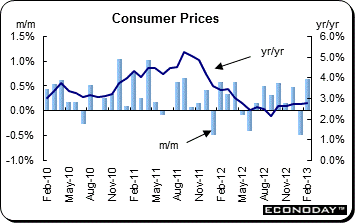 February consumer prices were up 0.7 percent on the month and were 2.8 percent above a year ago. The cost of clothing & footwear jumped 2.0 percent while furniture & household equipment climbed 1.5 percent. Transport costs increased 1.2 percent and housing, utilities & fuel bills were up 0.5 percent. The only decline was in alcohol & tobacco where prices slipped 0.5 percent on the month. The core CPI was up 0.6 percent from the start of the year but this was still soft enough to keep its annual rate steady at 2.3 percent. February consumer prices were up 0.7 percent on the month and were 2.8 percent above a year ago. The cost of clothing & footwear jumped 2.0 percent while furniture & household equipment climbed 1.5 percent. Transport costs increased 1.2 percent and housing, utilities & fuel bills were up 0.5 percent. The only decline was in alcohol & tobacco where prices slipped 0.5 percent on the month. The core CPI was up 0.6 percent from the start of the year but this was still soft enough to keep its annual rate steady at 2.3 percent.
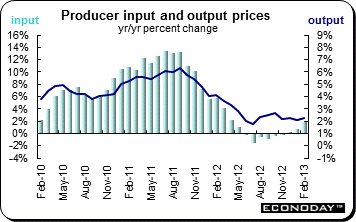 February producer output prices were up a hefty 0.8 percent on the month and 2.3 percent on the year. At the same time, input costs soared 3.2 percent from January and were up 2.5 percent on the year. Output prices were driven higher by a 3.7 percent monthly leap in petroleum products which alone added more than 0.4 percentage points to the headline change. The other main areas of strength were tobacco & alcohol (0.8 percent) and chemicals & pharmaceuticals (0.7 percent). Core output prices were up 0.3 percent from January and were just 1.3 percent higher on the year. Input costs were similarly biased up by a surge in energy prices. Crude oil soared 7.1 percent on the month to boost the overall input price index by almost 2 percentage points. By comparison other gains were mild although there were sizeable rises in imported metals (3.6 percent), imported parts & equipment (2.5 percent) and imported chemicals (2.2 percent), all in part reflecting the pound's recent losses against its U.S. counterpart. February producer output prices were up a hefty 0.8 percent on the month and 2.3 percent on the year. At the same time, input costs soared 3.2 percent from January and were up 2.5 percent on the year. Output prices were driven higher by a 3.7 percent monthly leap in petroleum products which alone added more than 0.4 percentage points to the headline change. The other main areas of strength were tobacco & alcohol (0.8 percent) and chemicals & pharmaceuticals (0.7 percent). Core output prices were up 0.3 percent from January and were just 1.3 percent higher on the year. Input costs were similarly biased up by a surge in energy prices. Crude oil soared 7.1 percent on the month to boost the overall input price index by almost 2 percentage points. By comparison other gains were mild although there were sizeable rises in imported metals (3.6 percent), imported parts & equipment (2.5 percent) and imported chemicals (2.2 percent), all in part reflecting the pound's recent losses against its U.S. counterpart.
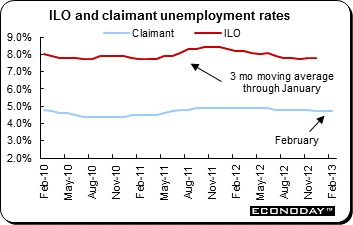 February claimant count unemployment was down 1,500 for the fourth consecutive monthly decline. The jobless rate on this measure was steady at 4.7 percent. By contrast, the ILO figures showed a 7,000 increase in the number of people out of work over the last three months although the unemployment rate was unchanged at 7.8 percent. However, total employment over the same period was up a respectable 131,000. Wage pressures remain very subdued. Headline average earnings growth in January eased to 1.2 percent from a softer revised 1.3 percent in December, its slowest pace since the beginning of 2012. In addition, regular earnings similarly slipped to a 1.2 percent annual rate, their weakest performance since the fourth quarter of 2009. February claimant count unemployment was down 1,500 for the fourth consecutive monthly decline. The jobless rate on this measure was steady at 4.7 percent. By contrast, the ILO figures showed a 7,000 increase in the number of people out of work over the last three months although the unemployment rate was unchanged at 7.8 percent. However, total employment over the same period was up a respectable 131,000. Wage pressures remain very subdued. Headline average earnings growth in January eased to 1.2 percent from a softer revised 1.3 percent in December, its slowest pace since the beginning of 2012. In addition, regular earnings similarly slipped to a 1.2 percent annual rate, their weakest performance since the fourth quarter of 2009.
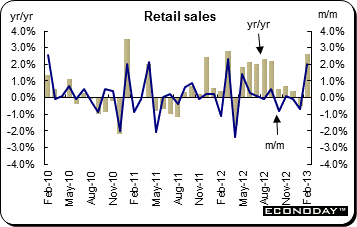 February retail sales jumped 2.1 percent and were up 2.6 percent on the year. The monthly jump was the steepest since March last year. Excluding auto fuel, purchases were up 1.9 percent from the start of 2013 and 3.3 percent from February 2012. Most categories enjoyed a good month. Non-store retailing climbed 3.4 percent on the month and the other stores sector posted a 5.2 percent surge. Clothing & footwear advanced 1.5 percent and household goods gained 3.1 percent within a solid 2.7 percent monthly increase in total non-food demand. Purchases of food grew 0.8 percent. Extreme volatility in the monthly data means that, despite the February bounce, sales volumes were actually down 0.2 percent compared with the previous period which, even allowing for probable bad weather effects, suggests that the underlying trend is broadly flat. February retail sales jumped 2.1 percent and were up 2.6 percent on the year. The monthly jump was the steepest since March last year. Excluding auto fuel, purchases were up 1.9 percent from the start of 2013 and 3.3 percent from February 2012. Most categories enjoyed a good month. Non-store retailing climbed 3.4 percent on the month and the other stores sector posted a 5.2 percent surge. Clothing & footwear advanced 1.5 percent and household goods gained 3.1 percent within a solid 2.7 percent monthly increase in total non-food demand. Purchases of food grew 0.8 percent. Extreme volatility in the monthly data means that, despite the February bounce, sales volumes were actually down 0.2 percent compared with the previous period which, even allowing for probable bad weather effects, suggests that the underlying trend is broadly flat.
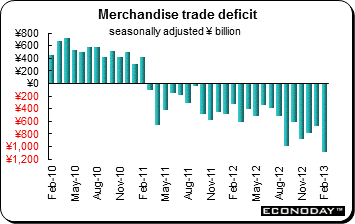 February merchandise trade deficit was Y777.5 billion. Exports were down 2.9 percent from a year ago while imports jumped 11.9 percent. On the year, exports to Asia dropped 5.2 percent and plunged 15.8 percent to China. Exports to the EU dropped 9.6 percent for the 17th consecutive drop. However, exports to the U.S. were up 5.7 percent for the second consecutive increase. On a seasonally adjusted basis, the trade deficit was Y1086.6 billion. The trade balance has been in deficit since the devastating earthquake and tsunami of March 2011. Seasonally adjusted exports were up 1.3 percent from January and up 1.6 percent on the year. Imports were up 6.8 percent on the month and 15.7 percent from a year ago. High energy imports for power generation continue to overwhelm a slow recovery in exports. The Lunar New Year holidays in China and some other Asian nations in mid-February slowed shipments from Japan. February merchandise trade deficit was Y777.5 billion. Exports were down 2.9 percent from a year ago while imports jumped 11.9 percent. On the year, exports to Asia dropped 5.2 percent and plunged 15.8 percent to China. Exports to the EU dropped 9.6 percent for the 17th consecutive drop. However, exports to the U.S. were up 5.7 percent for the second consecutive increase. On a seasonally adjusted basis, the trade deficit was Y1086.6 billion. The trade balance has been in deficit since the devastating earthquake and tsunami of March 2011. Seasonally adjusted exports were up 1.3 percent from January and up 1.6 percent on the year. Imports were up 6.8 percent on the month and 15.7 percent from a year ago. High energy imports for power generation continue to overwhelm a slow recovery in exports. The Lunar New Year holidays in China and some other Asian nations in mid-February slowed shipments from Japan.
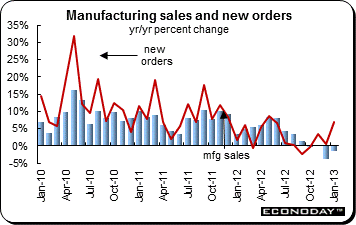 January manufacturing sales were down 0.2 percent and 1.6 percent lower from a year ago. However, new orders surged 5.1 percent while backlogs were up an even more robust 5.8 percent. However, inventories climbed 1.7 percent which, taken together with the slide in sales, saw the inventory/sales ratio gain 0.02 months to 1.36 months. January manufacturing sales were down 0.2 percent and 1.6 percent lower from a year ago. However, new orders surged 5.1 percent while backlogs were up an even more robust 5.8 percent. However, inventories climbed 1.7 percent which, taken together with the slide in sales, saw the inventory/sales ratio gain 0.02 months to 1.36 months.
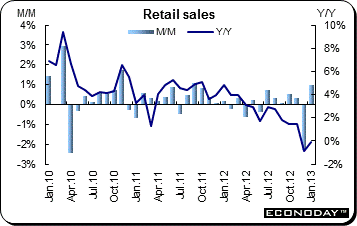 January retail sales were up 1.0 percent but slipped 0.1 percent from a year ago. January's jump in nominal sales was wholly attributable to higher prices, particularly at new car dealers. Volume purchases were only unchanged on the month. Motor vehicle & parts gained 2.8 percent — excluding this sector the advance in total sales was halved to 0.5 percent. The other main contributors were furniture & home furnishings (1.1 percent), electronics & appliances (2.3 percent), clothing & accessories (1.2 percent) and general merchandise stores (2.8 percent). Miscellaneous stores (9.4 percent) also enjoyed a strong period. Partial monthly offsets were seen in gasoline (down 1.4 percent), health & personal care (down 1.0 percent), building materials & equipment (down 0.7 percent) and food & drink (down 0.4 percent). January retail sales were up 1.0 percent but slipped 0.1 percent from a year ago. January's jump in nominal sales was wholly attributable to higher prices, particularly at new car dealers. Volume purchases were only unchanged on the month. Motor vehicle & parts gained 2.8 percent — excluding this sector the advance in total sales was halved to 0.5 percent. The other main contributors were furniture & home furnishings (1.1 percent), electronics & appliances (2.3 percent), clothing & accessories (1.2 percent) and general merchandise stores (2.8 percent). Miscellaneous stores (9.4 percent) also enjoyed a strong period. Partial monthly offsets were seen in gasoline (down 1.4 percent), health & personal care (down 1.0 percent), building materials & equipment (down 0.7 percent) and food & drink (down 0.4 percent).
The turmoil over Cyprus trumped economic news including the FOMC announcement on Wednesday. At this writing, negotiations continue in an attempt to reach a package by Monday — the day the ECB said it will stop supporting Cyprus. The Federal Reserve left its policy unchanged. Economic data for Europe disappointed but did not for the U.S.
The last week of the month brings its usual spate of new economic data especially from Japan. February unemployment, consumer prices, industrial output and consumer spending are on the calendar. It is also the last week of the first quarter of 2013 and the end of Japan’s fiscal year.
| The following indicators will be released this week... |
| Europe |
|
|
| March 25 |
Germany |
Retail Sales (February) |
| March 27 |
Eurozone |
Consumer and Business Sentiment (March) |
|
|
Harmonized Index of Consumer Prices (March, flash) |
|
France |
Gross Domestic Product (Q4.12 final) |
|
UK |
Gross Domestic Product (Q4.12 final) |
| March 28 |
Germany |
Unemployment (March) |
| March 29 |
France |
Consumption of Manufacturing Goods (February |
|
|
Producer Price Index (February) |
|
Italy |
Producer Price Index (February) |
| |
|
|
| Asia/Pacific |
|
|
| March 28 |
Japan |
Retail Sales (February) |
| March 29 |
Japan |
Manufacturing PMI (March) |
|
|
Household Spending (February) |
|
|
Unemployment (February) |
|
|
Consumer Price Index (February) |
|
|
Industrial Production (February) |
| |
|
|
| Americas |
|
|
| March 27 |
Canada |
Consumer Price Index (February) |
| March 28 |
Canada |
Monthly GDP (January) |
Anne D Picker is the author of International Economic Indicators and Central Banks.
|

